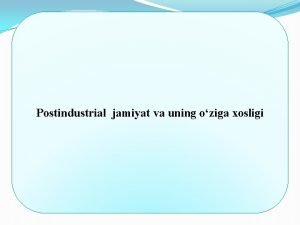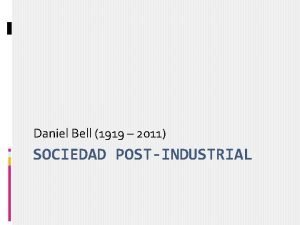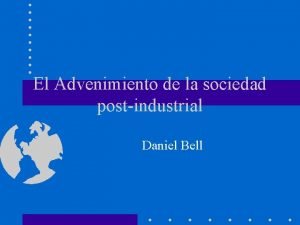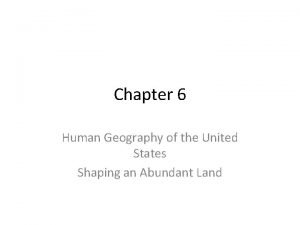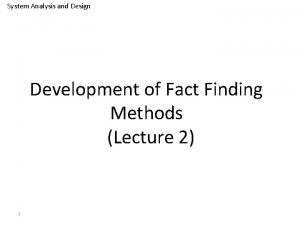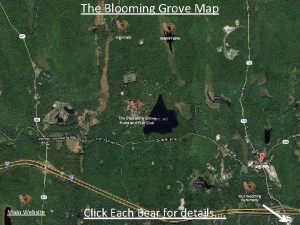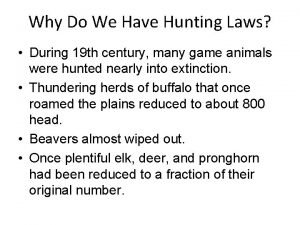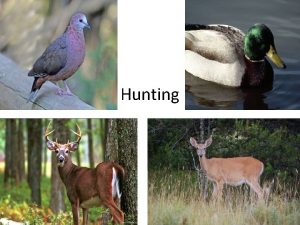Types of Socities Hunting and gathering to postindustrial













- Slides: 13

Types of Socities Hunting and gathering to postindustrial

Types of Society • Society is made of people living in a defined territory with borders and sharing common culture – Meets basic needs of people (food, shelter, etc) • 3 types of Society are preindustrial, and postindustrial – Independent vs. global society?

H and G Society • Hunting and Gathering Society: survives by hunting their food and gathering edible food like wild fruits and veggies • Nomadic, non-materialistic, small, cooperation, no private property • Tasks based on gender and age • Few exist today


Horticulture Society - Society that exists primarily through growing plants - Leads to more permanent settlements - Multi-community societies, thousands - Dependency shifts from others to family

Pastoral Societies • Society where food is obtained by raising and taking care of animals (milk and meat) • Farming must be done to feed the animals • Male dominated; role of woman is minimal and food depends on the male • Change location seasonally

Pastoral and Horticultural changes • ***creating a surplus (plants or animals) allow other roles to emerge, trade to happen, and free time to be found*** • Social classes begin to form

Agricultural Societies • Similar to horticultural, but with animals and plows • Plow allows more productivity • More free time= school, arts, religion, and politics • Distinct social classes • Trade economy and monetary systems

Industrial Societies • Society that depends on science and technology • Mechanizationreplacing animal and to produce goods and human power with services machines • “away” from simple and • Urbanization- moving “towards” technology population from farms • Innovations: and villages into large – Steam engine and cities electricity – Nuclear energy and computers/internet

Industrialization changes society • Education- changes from home school to formal schooling – More broad education necessary • Families- as population spreads out, blood relationships fade • Woman at work- more independent

Durkheim’s Views • Social Solidarity- degree to which society is unified, results of division of labor • Mechanical solidarity- social unity where people doing similar work and having similar values – Tradition, family, conformity • Organic solidarity- social unity where people depend on each other to fulfill needs, more complex status.

Postindustrial Society • Society where economic emphasis is services and information vs. goods production 1. 2. 3. 4. 5. More employment in service industry (75% in US) White-collar replaces blue-collar Technical knowledge is key Tech. change is planned and assessed Reliance on computers

Postindustrial social instability • Crime and disorder grow • Families take on different roles and kinship less important • Establishing new norms and values bring back stability.
 Industrial jamiyat
Industrial jamiyat Sociedades postindustriales
Sociedades postindustriales Daniel bell el advenimiento de la sociedad postindustrial
Daniel bell el advenimiento de la sociedad postindustrial Why is the united states called a postindustrial economy
Why is the united states called a postindustrial economy Fact finding methods in system analysis and design
Fact finding methods in system analysis and design News gathering
News gathering Blooming grove hunting and fishing club website
Blooming grove hunting and fishing club website Hunting guide salary
Hunting guide salary Why do we have hunting laws
Why do we have hunting laws Screen with siege of belgrade and hunting scene
Screen with siege of belgrade and hunting scene Migratory bird hunting and conservation stamp act
Migratory bird hunting and conservation stamp act Whats an acrostic poem
Whats an acrostic poem Nyala shot placement
Nyala shot placement Dove hunting 101
Dove hunting 101
